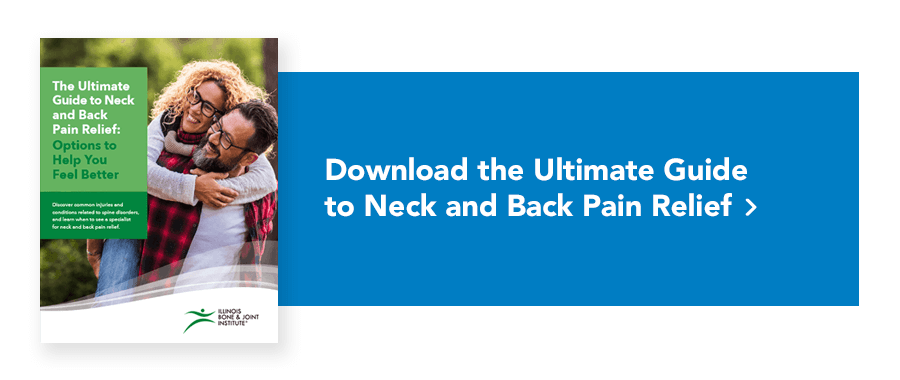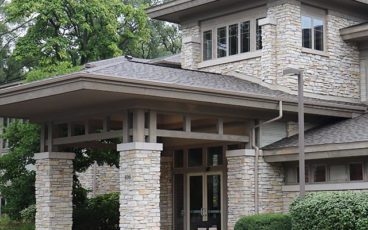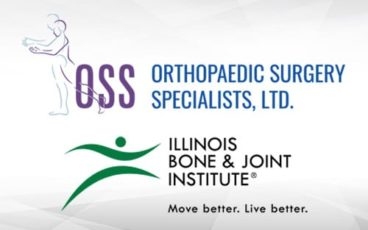Many minor stiff neck causes heal quickly, like sleeping in the wrong position. But occasionally, a stiff neck can have more severe implications.
Read on to learn about five common causes of neck stiffness and back pain, and find out what you can do to get relief.
Stiff Neck Causes and Disorders
You might be able to figure out why your neck is sore by tracing it back to an event. You may have helped a friend move, worked in the garden over the weekend or gotten rear-ended. But other stiff neck issues are not as apparent.
The following are some common stiff neck causes:
Muscle Strain or Sprain
The levator scapula muscle running the length of the back and side of the neck connects the cervical spine to the shoulder and is controlled by the third and fourth cervical nerves. A muscle sprain or strain, particularly in this area, can lead to a stiff neck.
You can strain this muscle while doing many everyday activities, such as:
- Sleeping without proper support from a pillow (or with poor posture) can stretch this muscle unnecessarily.
- Any repetitive activity that involves turning the head from side to side, as in swimming, can result in a stiff neck.
- Poor posture that tilts the head, like cradling a phone between your neck and shoulder or viewing the computer monitor for long hours, causing your neck muscles to contract.
- Stress that causes tension knots in the neck.
Cervical Spine Disorders
The cervical spine consists of the spinal cord, vertebrae, and discs of the upper part of your neck. When any part of the cervical spine becomes misaligned, it will cause pain and stiffness to the neck.
This neck stiffness can indicate an underlying disorder, such as:
- Facet Joint Disorders: Facet joint disorders occur when the facet joints at the back of the spinal structure that help with movement wear out because of osteoarthritis.
- Herniated Disc: A herniated disc is a serious condition that can cause terrible irritation and pain to the nerve roots in the disc of your neck and pain along your arms.
- Cervical Osteoarthritis: Can cause muscle spasms and neck stiffness from blocked nerve pathways in the cervical spine.
Meningitis/Infections
Bacterial infection in the fluid membrane of the brain and spinal cord causes inflammation and stiffening of the neck along with a high fever, headache, and nausea.
Seek immediate medical attention if you notice any such symptoms, as they could indicate meningitis. Other rare but severe infections can also be stiff neck causes, such as meningococcal disease or vertebral osteomyelitis in the cervical spine and vertebral body.
Neck stiffness, fever, nausea, and light sensitivity can also be signs of a common viral infection like the flu, so it’s essential to see a doctor for a proper diagnosis.
Neck Injuries
An accident, sports mishap, or fall in which your head has been jerked around violently may result in muscle injuries, sprains, and even strains on the ligaments in your neck. These injuries can be stiff neck causes and result in pain.
Neck Arthritis
Osteoarthritis is daily wear and tear of your neck joints as you age and can lead to stiffness and limited neck movement. By comparison, rheumatoid arthritis is an autoimmune disorder that can affect your neck joints along the upper part of your neck, resulting in severe neck pain and stiffness.
Sometimes arthritis can also lead to your spinal canal narrowing, which results in a pinched nerve causing neck stiffness and radiating pain down your arms and legs.
Stiff Neck Treatments
If stiff neck symptoms persist for more than a week, you may need medical attention. Your physician may order an X-ray or computed tomography (CT) scan along with a physical examination to diagnose the cause of your stiff neck.
Your treatment will depend on your specific stiff neck causes, but in most cases, initial treatments will be conservative. These non-invasive treatments for neck stiffness may include:
- Non-steroid anti-inflammatory drugs (NSAIDs) to relieve pain
- Icing the stiff neck for the first 48 to 72 hours to reduce inflammation, then switching to a heat wrap or hot shower to soothe muscles
- Wearing a cervical collar to rest your neck muscles
- Limiting physical activities that can strain your neck
- Physical therapy
- Massage or acupuncture treatment
- Neck stretching exercises like slowly moving your head up and down and side to side
- Changing your mattress or pillow to ensure proper neck support
IBJI Can Help With Neck Stiffness and Pain
The neck doctors at IBJI can get to the bottom of your stiff neck causes and create a specialized care plan to relieve your symptoms and help you feel and move better.
Schedule online with an IBJI spine specialist today.
You Might Also Like:
- Alleviate Acute Neck and Back Pain at IBJI’s Back to Life Clinic
- Fit Your Backpack to Avoid Back and Neck Pain
- Is Cervical Degenerative Disc Disease Causing Your Neck Pain?
*This content is for information only and is not intended to replace the diagnosis, treatment, or medical advice from your treating healthcare professionals. The content does not provide medical advice, does not constitute the practice of medicine or other healthcare professional services, and does not create a doctor-patient relationship. You should not rely on this information as a substitute, nor does it replace professional medical advice, diagnosis, or treatment. If you have concerns or questions, seek the advice of your healthcare professionals. If you think you may have a medical emergency, call your doctor or 911 immediately. Do not rely on electronic communications or communicate through this website for immediate, urgent medical needs. This website is not designed to facilitate medical emergencies. The use of the information is at the reader’s own risk. The links are provided for information and convenience only. We cannot accept responsibility for the sites linked or the information found here. A link does not imply an endorsement of a site.





